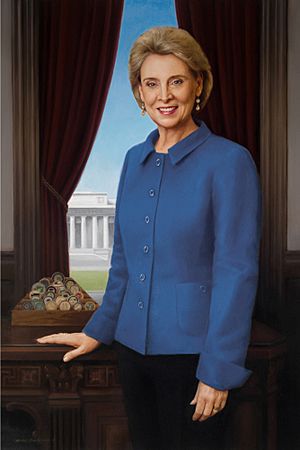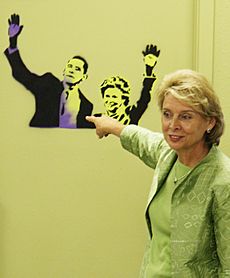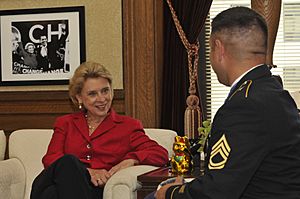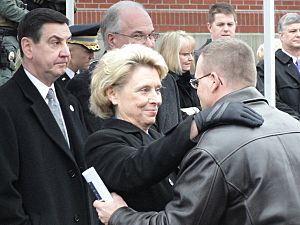Christine Gregoire facts for kids
Quick facts for kids
Christine Gregoire
|
|
|---|---|
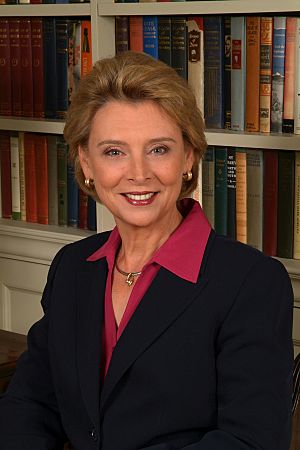
Official portrait, 2006
|
|
| 22nd Governor of Washington | |
| In office January 12, 2005 – January 16, 2013 |
|
| Lieutenant | Brad Owen |
| Preceded by | Gary Locke |
| Succeeded by | Jay Inslee |
| Chair of the National Governors Association | |
| In office November 15, 2010 – July 17, 2011 |
|
| Preceded by | Joe Manchin |
| Succeeded by | Dave Heineman |
| 16th Attorney General of Washington | |
| In office January 13, 1993 – January 12, 2005 |
|
| Governor | Mike Lowry Gary Locke |
| Preceded by | Ken Eikenberry |
| Succeeded by | Rob McKenna |
| Director of the Washington State Department of Ecology | |
| In office January 1, 1988 – January 6, 1992 |
|
| Governor | Booth Gardner |
| Succeeded by | Chuck Clarke |
| Personal details | |
| Born |
Christine O'Grady
March 24, 1947 Adrian, Michigan, U.S. |
| Political party | Democratic |
| Spouse |
Mike Gregoire
(m. 1974) |
| Children | 2 |
| Education | University of Washington (BA) Gonzaga University (JD) |
Christine Gregoire (born March 24, 1947) is an American lawyer and politician. She served as the 22nd Governor of Washington from 2005 to 2013. A member of the Democratic Party, she was Washington’s second female governor.
Before becoming governor, Gregoire was the Attorney General of Washington from 1993 to 2005. She was the first woman to hold that job. As of July 2025, she is the oldest living former Governor of Washington.
Early Life and Education
Christine Gregoire was born in Adrian, Michigan. She grew up in Auburn, Washington. Her mother, Sybil Grace Jacobs, worked as a cook.
After high school, Christine went to the University of Washington. She earned a degree in speech and sociology in 1969. Later, she studied law at Gonzaga University School of Law and became a lawyer in 1977.
Leading the Department of Ecology
Gregoire was the director of the Department of Ecology for four years. She helped create the Pacific States/British Columbia Oil Spill Task Force. This group worked with the Canadian government to deal with oil spills. It also addressed concerns about oil transportation along the West Coast.
Cleaning Up Hanford
While at the Department of Ecology, Gregoire worked on the Hanford Site cleanup. This site produced plutonium for World War II and the Cold War. Decades of production created millions of gallons of dangerous radioactive waste.
In 1989, the Department of Ecology, the U.S. Environmental Protection Agency (EPA), and the U.S. Department of Energy (DOE) signed the Tri-Party Agreement. This agreement set goals for cleaning up the site.
Working with Native American Tribes
Gregoire also played a key role in the Centennial Accord. This agreement helped build better relationships between Washington State and Native American tribes. It helped them work together on shared interests, like managing natural resources.
Attorney General of Washington
In 1992, Gregoire was elected Attorney General. She won by a large margin. She was the first and only woman to serve in this role in Washington. She was reelected in 1996 and 2000.
As Attorney General, Gregoire focused on issues affecting children. She helped improve the juvenile justice system. She also worked to protect people from identity theft.
Tobacco Settlement Agreement
During her second term, Gregoire led a major effort against tobacco companies. Many states sued these companies for misleading advertising. In 1997, Gregoire helped negotiate a settlement. This agreement required tobacco companies to pay over $206 billion to states. This money helped states pay for health care costs related to smoking.
Washington State received $4.5 billion from this settlement. Gregoire and Governor Gary Locke asked the state legislature to use some of this money for tobacco prevention and education programs.
Governor of Washington (2005–2013)
Christine Gregoire became the Governor of Washington in 2005. She won a very close election against Dino Rossi. The election was so close that it needed several recounts. After a long legal process, Gregoire was declared the winner by a very small number of votes.
2008 Governor Election
In 2008, Gregoire ran for reelection against Dino Rossi again. She supported Barack Obama in the presidential election, which helped bring out many Democratic voters. Gregoire won the election with 53% of the vote.
Key Changes as Governor
Education
As governor, Gregoire made big changes to Washington's education system. She worked to improve early learning programs for young children. She also focused on making sure students were ready for college.
She signed bills to create an Early Learning Council and a Department of Early Learning. These groups worked to strengthen programs for children and families. Gregoire also led a committee to rethink Washington's education system for the modern world. This group suggested investing in early learning, improving math and science teaching, and helping every student succeed.
Public Health
Gregoire worked to make health care more affordable and accessible in Washington. She proposed changes to how the state bought health care services. She aimed to lower health care costs for citizens.
She signed the "Cover All Kids Law" in 2007, which helped more children get health care coverage. She also supported the federal Affordable Care Act. This law aimed to expand health insurance coverage to more people, especially those with lower incomes. Gregoire helped set up a health insurance exchange in Washington, one of the first states to do so.
Environment
Gregoire focused on cleaning up Puget Sound, aiming to make it healthier for fish, swimming, and digging for shellfish. In 2007, she created the Puget Sound Partnership to help achieve this goal.
She also took action to fight climate change. In 2009, she ordered state actions to reduce greenhouse gases. In 2011, she signed a law that moved Washington state away from using coal for power.
LGBT Rights
Gregoire supported equal rights for LGBTQ+ people in Washington. In 2006, she signed a bill that protected people from discrimination based on their sexual orientation and gender identity. In 2007, she signed a law giving same-sex couples domestic partnership rights.
Later, she signed a bill that gave state-registered domestic partners the same rights as married couples. Washington voters approved this measure in a statewide vote. In 2012, Gregoire announced her support for same-sex marriage. She signed a bill allowing it, and voters approved it later that year.
Transportation
Gregoire worked on many transportation projects. In 2006, she signed a law requiring fuel suppliers to include biodiesel and ethanol in their fuels. This was the first such requirement in the nation.
She also supported building two major projects: a new 520 floating bridge and a deep bore tunnel to replace the aging State Route 99 Alaskan Way Viaduct in Seattle. She also helped create the nation's first "electric highway," a network of electric vehicle charging stations.
Life Sciences Discovery Fund
In 2005, Gregoire created the Life Sciences Discovery Fund. This fund gives money for research in health and agriculture. It uses money from the tobacco settlement she helped secure. This fund helps find cures for diseases and improve farming.
Aerospace
Gregoire worked to boost Washington's aerospace industry. She formed the Aerospace Council to develop training and research in this field. Washington is home to many aerospace companies, including Boeing.
Government Reforms
Gregoire worked to make state government more efficient. She signed a budget that included reforms to the pension system. She also merged several state agencies to save taxpayer money.
Great Recession
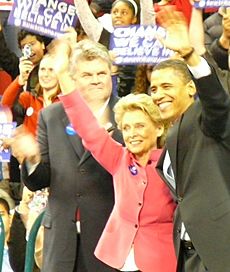
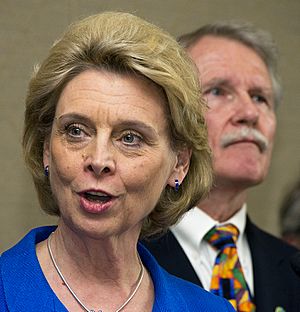
During the Great Recession, Gregoire launched plans to help Washington's economy. She created the "Washington Jobs Now" package to create jobs. She also increased unemployment benefits and supported federal efforts to invest in infrastructure. She worked to streamline government and cut costs.
Gregoire also focused on increasing exports from Washington. She led trade missions to Europe, China, and Japan to help state businesses sell their products globally.
After Being Governor
Gregoire's term as governor ended in January 2013. After leaving office, she became a public speaker.
In July 2013, she joined the board of the Fred Hutchinson Cancer Research Center. This center does important research on diseases like cancer.
From August to December 2014, Gregoire was a fellow at the Harvard Institute of Politics. She talked with students about leadership in government.
Challenge Seattle
In 2015, Gregoire helped start Challenge Seattle. This group is an alliance of CEOs from large companies in the region. As its CEO, Gregoire focuses on improving education, housing, and transportation in the Seattle area.
Personal Life
Christine Gregoire has two daughters, Courtney and Michelle. Courtney was appointed to the Seattle Port Commission in 2013. Courtney has two children. Christine Gregoire lives in Lacey with her husband, Michael.
In 2003, she was diagnosed with breast cancer early on. She had surgery and recovered. She often talks about her experience with cancer when discussing health care.
Awards and Honors
In 2007, Governing magazine named Gregoire one of its "Public Officials of the Year."
She has received honorary degrees from Gonzaga University, Washington State University, and the University of Washington.
Images for kids
-
Gregoire (center), stands with Seattle Mayor Greg Nickels (left) and U.S. Senator from Illinois Barack Obama (right) at a rally for Obama's presidential campaign at KeyArena on February 8, 2008.
-
Governor Gregoire and Oregon Governor John Kitzhaber announce the Columbia River Crossing plan in 2011.
See also
 In Spanish: Christine Gregoire para niños
In Spanish: Christine Gregoire para niños
 | Misty Copeland |
 | Raven Wilkinson |
 | Debra Austin |
 | Aesha Ash |


